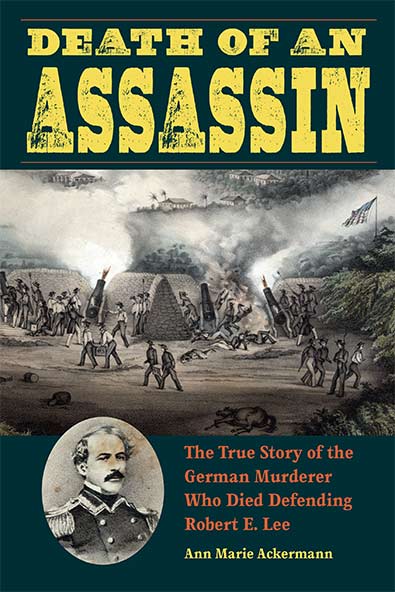Death of an Assassin
The True Story of the German Murderer Who Died Defending Robert E. Lee
Audiobooks, Award Winners, Books, Military History, True Crime, True Crime HistoryAnn Marie Ackermann
A true crime story of assassination, military heroism, and international intrigue
![]()
Winner of the 2018 Bronze IPPY (Independent Publisher Book Awards), True Crime.
From the depths of German and American archives comes a story one soldier never wanted told. The first volunteer killed defending Robert E. Lee’s position in battle was really a German assassin. After fleeing to the United States to escape prosecution for murder, the assassin enlisted in a German company of the Pennsylvania Volunteers in the Mexican-American War and died defending Lee’s battery at the Siege of Veracruz in 1847. Lee wrote a letter home, praising this unnamed fallen volunteer defender. Military records identify him, but none of the Americans knew about his past life of crime.
Before fighting with the Americans, Lee’s defender had assassinated Johann Heinrich Rieber, mayor of Bönnigheim, Germany, in 1835. Rieber’s assassination became 19th-century Germany’s coldest case ever solved by a non–law enforcement professional and the only 19th-century German murder ever solved in the United States. Thirtyseven years later, another suspect in the assassination who had also fled to America found evidence in Washington, D.C., that would clear his own name, and he forwarded it to Germany. The German prosecutor Ernst von Hochstetter corroborated the story and closed the case file in 1872, naming Lee’s defender as Rieber’s murderer.
Relying primarily on German sources, Death of an Assassin tracks the never-before-told story of this German company of Pennsylvania volunteers. It follows both Lee’s and the assassin’s lives until their dramatic encounter in Veracruz and picks up again with the surprising case resolution decades later.
This case also reveals that forensic ballistics—firearm identification through comparison of the striations on a projectile with the rifling in the barrel—is much older than previously thought. History credits Alexandre Laccasagne for inventing forensic ballistics in 1888. But more than 50 years earlier, Eduard Hammer, the magistrate who investigated the Rieber assassination in 1835, used the same technique to eliminate a forester’s rifle as the murder weapon. A firearms technician with state police of Baden-Württemberg tested Hammer’s technique in 2015 and confirmed its efficacy, cementing the argument that Hammer, not Laccasagne, should be considered the father of forensic ballistics.
The roles the volunteer soldier/assassin and Robert E. Lee played at the Siege of Veracruz are part of American history, and the recordbreaking, 19th-century cold case is part of German history. For the first time, Death of an Assassin brings the two stories together.
“An Edgar-worthy true crime masterpiece of astonishing investigative skill and irresistible narrative flow. I know the term “must read” is overused, but I’m going to use it again — Ann Marie Ackermann’s new book is a must read!”
—Burl Barer, NYT-best-selling author of Murder in the Family and Man Overboard
“A page-turner of historical scholarship, Death of an Assassin takes a little known German cold case murder from 1835 and turns it into an intriguing mystery. Using a style reminiscent of Case Closed, author Ann Marie Ackermann puts you in Bonnigheim when the assassin pulls the trigger and later Mexico, where the fleeing assassin engulfs Robert E. Lee in tragedy, long before Lee ever heard the canon near Appomattox Court House.”
—Fred Rosen, author of Murdering the President: Alexander Graham Bell and the Race to Save James Garfield
“In her excellent work, Death of an Assassin, Ann Marie Ackermann has penned a fascinating account of a long-ago murder; a murder that should have remained tucked away somewhere in the dark archived files of history, never again to see the light of day. Thankfully for us, however, the author has not only rescued this strange tale from obscurity, but has brought to light a story that begins with the murder in Germany, and ends up in the pre-Civil War America of Robert E. Lee, where the killer begins an eventful new life.
“With a sharp eye for detail, Ackermann painstakingly reconstructs the lives of the participants from long-hidden facts, and then, having breathed life back into them, paints a vivid literary picture throughout the pages of her riveting book. It’s a tale that will pull you in from the very first page.”
—Kevin M. Sullivan, author of The Bundy Murders: A Comprehensive History and Custer’s Road to Disaster: The Path to Little Bighorn
Birds, Bullets, and a Bad Guy
A Psychology Today review
Book Review: “Death of an Assassin: The True Story of the German Murderer Who Died Defending Robert E. Lee” by Ann Marie Ackermann
A review by Steven Maginnis
“An engaging piece of history.” — Tim Gebhart
“Death of an Assassin is not only a startling historical discovery but a poignant tale of heroism and redemption. With a marvelous eye for detail, Ann Marie Ackermann has navigated through long-forgotten records on both sides of the Atlantic to unearth a new and complex kind of hero — a brutish, vengeful man who, perhaps out of remorse, was anxious to start a new life and redeem himself in his adopted home. It’s a great story, bolstered by solid research and told by one who is uniquely qualified to bring it to the public.” — Michael W. Kauffman, author of American Brutus: John Wilkes Booth and the Lincoln Conspiracies)
“Ann Marie Ackermann has marvelously weaved a story of diverse themes into a single fabric of historical research and investigation. Written in a conversational style and drawing the reader into the web of mystery produces a story of high interest and adventure.” — Anthony Waskie, assistant professor, Temple University, author of Philadelphia and the Civil War





